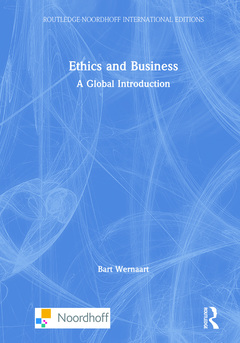Ethics and Business A Global Introduction Routledge-Noordhoff International Editions Series
Auteur : Wernaart Bart

Ethics in business is not a new topic and has been intensely discussed since the emergence of the so-called limited companies. However, privatization, technological and digital innovation, changes in moral perception, economic and financial crises and globalization stir a more recent debate on how companies should behave in our societies.
This book starts from the position that ethics in business should imply an open debate on norms and values, using a sound methodology to get there. Ethics should cross borders: not only the borders of a country, but also the borders of someone?s moral imagination. Ethics should not only be about harmony but also about conflict (and how to deal with that). Ethics should be realistic and well substantiated by academic research. Ethics should be used to understand the complexity of the world, and the challenges companies struggle with on various levels.
Therefore, this book is composed of three parts in which ethics is discussed at different levels. In part one we discuss ethics at the level of the individual. In part two we discuss ethics and business. In the third part, ethics is discussed in the context of a globalized world.
In each chapter, we discuss the ethical complications of each topic from various ? and preferably opposing ? perspectives. Each perspective is methodologically and academically substantiated. Each chapter ends with an extensive literature list in which the original sources are listed for further reading. Furthermore, at the end of each chapter, a summary is written in which the most important definitions and viewpoints are highlighted. The frequent use of colorful and bold examples make this an accessible read for bachelor and master students at business schools and professionals in international business.
Introduction
Part 1
Ethics and the individual
1 What is ethics?
1.1 Ethical behaviour?
1.2 Ethics as an academic discipline
1.3 Morality
1.4 The structural analysis
1.5 The structural evaluation
1.6 Ethics and related disciplines
Summary
Literature
2 Responsibility
2.1 The meaning of responsibility
2.2 The ability to take responsibility
2.3 Situational factors that influence responsibility
Summary
Literature
3 Normative ethics
3.1 Directions in normative ethics
3.2 Ethics for people
3.3 Ethics from people
3.4 Directions in ethics applied
Summary
Literature
4 A model for ethical
decision-making
4.1 An ethical dilemma
4.2 Step 1: moral questions
4.3 Step 2: moral stakeholders
4.4 Step 3: alternatives
4.5 Step 4: an informed choice
Summary
Literature
Part 2
Business and ethics
5 A short history of ethics in business
5.1 The industrial revolution
5.2 Current trends in society
5.3 The triple bottom line
Summary
Literature
6 Social values
6.1 The industrial revolution and social values of workers
6.2 Rights of workers in developed countries
6.3 Challenges in developed countries
6.4 Challenges in developing countries
6.5 Corruption
6.6 Social values of consumers
Summary
Literature
7 Ecological values
7.1 The tragedy of the commons
7.2 Towards a circular economy
Summary
Literature
8 Economic values
8.1 Economic values
8.2 Profit
Summary
Literature
9 Accountability
9.1 Transparency and compliance
9.2 The business of business is business
9.3 Voluntary accountability
9.4 Mandatory accountability
9.5 Collective industry self-regulation
Summary
Literature
Part 3
Ethics in a globalized world
10 Cultural diversity
10.1 Culture
10.2 Cultural differences on various levels
10.3 Cultural differences and business
10.4 Cultural differences between countries
Summary
Literature
11 Globalization: does the system work?
11.1 Why globalization is a good thing
11.2 Why globalization is a bad thing
Summary
Literature
Index
About the author
Bart Wernaart is Lecturer in International Business and Management at the Fontys University of Applied Sciences, Netherlands.
Date de parution : 05-2021
17x24 cm
Thèmes d’Ethics and Business :
Mots-clés :
West Sahara; Moral perception; ALS Researcher; Financial crises; DNA Composition; Ethics; Uncertainty Avoidance; Digital innovation; Vice Versa; Adolf Hitler; Energy Recovery; UN; Violates; Ethical Decision Model; Tv Interview; Labour Parties; Moral Stakeholders; Ivory Coast; Uncertainty Avoidance Index; Power Distance Index; UK Brand; Triple Bottom Line; Vincent Van Gogh; DNA Research; Islamic Banking; Sophie’s Choice; UK Job; CSR Activity; CSR Policy



